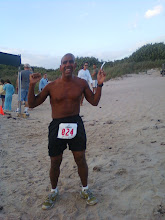Monday, May 29, 2017
Why You Should Keep Track of Your Training
Keeping track of your training is important if you want to succeed in your athletic performance. This is true for everyone from beginners to the pros.
I thought of that recently after I finished my strength endurance workout. I had earlier in the morning done about 20:00 + of lunges & presses, then ran a moderately quick 1.6 mile rainy run. I then headed off to the pool but work was cancelled due to storms. So after taking care of a few errands, I returned home & started my strength endurance workout.
As usual pull ups were the focus of my work out. And as I mentioned in my earlier post on "How to Go From 0 - 20 Pull Ups" I try to get a minimum of 100 pull ups 3 - 5 days a week. Since I had time, I decided to push it & see if I could hold at 10 reps per set, completing 10 sets. Remember, 20 reps is my current max so this is obviously 50 % of my max.
Previously, I've stopped at 8 - 9 reps per set and this was very tough. But recently I've been able to hold 7 - 8 reps per set, including some difficult type pull ups like ledge pull ups & towel pull ups. So I thought maybe I could push it up to 10 regular pull ups per set.
Of course recovery between sets is another factor. And remember, to achieve maximum fitness & athletic performance it's best to do active recovery, in circuit form, activities which work other muscles . So in this case I chose to do 15 push ups, 25 lower back Superman exercise, 25 abs ( leg raises or flutter kicks,etc) & 5 one leg squats. Each set averaged 6:00 - 7:00 per set! One of the main reasons was maintaining balance in the one leg squats. This workout combined mostly strength endurance for high reps ( pull ups, push ups,lower back & abs) but also included maximal strength & balance ( the one leg squats ). But you get the point.
It took me an 1:11:00 + but I achieved what I wanted, holding 10 pull ups per set. Compared to just a couple of recent months ago I improved. And this is why it's important to keep track of your workouts.
The same thing I found out about my running. As I mentioned in my post on Accomplishments, in January & February I had a terrible half marathon & full marathon. However I started to work on my speed again, doing shorter races . My goal has been in both training & races to get my miles under 9:00, and at the last mile a sub 8:00 pace as well as when I do track work ( quarter miles, half miles ). Well, in the last few months I've been able to get miles in the sub 9:00 in medium distances ( 2 - 6 miles) , & yes getting my last mile in under 8:00. I've also been able to get quarters & halves on the track in the sub 8:00 pace. Again, compared to a few months ago a definite improvement. You see what I'm saying.
When you keep track of your workouts it's a good idea to make notes about the variables. As I mentioned earlier when I did 10 pull ups per set I was active but I was also averaging 6:00 - 7:00 per set. In the future if I can do 10 pull ups in 5:00 or even 4:00 per set I can see my recovery time has decreased. Or in the case of running, using my Garmin GPS watch, I've been able to see my stride rate & stride length greatly increase in fast miles. This type of feedback can tell you what can help you & where you need to work on.
There are many websites & apps , some free, that can keep track of your workouts. For endurance athletes especially ( running, swimming, biking) ,you may want to consider something like GPS apps like Garmin or Polar which as I mentioned track your pace, cadence, heart rate,etc. They also usually allow you to make notes about your workouts. There are other factors which can affect your activity. When running for example, take in to account whether it was windy, was it hot? When running on the beach there are more factors such as whether it was soft sand or firm sand as well as were there lots of shells on the beach, was it slanted,etc?
I should add while these GPS watches have all these features they definitely aren't cheap! And as a beginner you certainly don't need to buy those. A simple stop watch is more than enough. And for strength athletes/activities ( Olympic lifting, body weight exercises, boxers,etc) a GPS watch is definitely not needed. Even for those who do endurance activities as part of your training/job ( military, first responders, obstacle race challenge athletes,etc ) a notebook is probably good enough unless you can afford it. However for endurance athletes as you improve, you may want to consider investing in one of these GPS watches. They are a definite plus in endurance training.
So start keeping track of your workouts, along with all the variables around them, & use these to improve your performance & achieve new heights.
Subscribe to:
Post Comments (Atom)

No comments:
Post a Comment